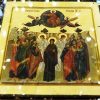The value of every activity lies in the goal to which it aspires. Our goal in the fast is nothing other than the resurrection. Do you see how we follow the path of our struggle without losing sight of the aim of fasting, which leads us to taste the joy of the resurrection of our Lord on the day of Pascha?
The cross only exists because it transforms us for rebirth. We only deal with the passion in the Church because it draws us to joy: this is the joy of children in welcoming the Lord on Palm Sunday, coming for His saving passion and likewise the joy of the mystery of the cross in the middle of Holy Week.
The Lord enters into our life in order to end the sorrow of our suffering. Suffering is also the harmful passions. “From my youth have many passions warred against me, but do Thou Thyself defend and save me, O Savior.”
This requires patience and prayer. All of these things are steps of repentance in our struggle of fasting, to the degree that we distance ourselves from worldly cares and focus, more and more, on spiritual struggles: fasting, praying, regard for the other through works of charity. In the world there is pain and adversity. Medicine and psychology do not heal on their own since they require God’s resting in the soul of man. Therefore the Church exists for the sake of healing soul and body.
The activity of bearing the cross requires constant motion towards God. Psychology treats the knot in one one’s soul, but it does not reach the heart’s spiritual rest. Man’s perfect healing is not complete without divine sympathy, the visitation of uncreated grace. We Christians madly cling to the sign of the cross because “through the cross joy came into all the world.”
On the tree of the cross, Christ was victorious of sin, death and evil.
The Christian’s life is an adventure like the adventure of the Lord in His life on earth. In it there is suffering, there are afflictions and temptations, but at the same time there is a foretaste of Christ’s passion and resurrection.
The Apostle Paul says in his Epistle to the Philippians, “Rejoice in the Lord always, and again I say, rejoice!”
+Ephrem
Metropolitan of Tripoli, al-Koura and their Dependencies

















